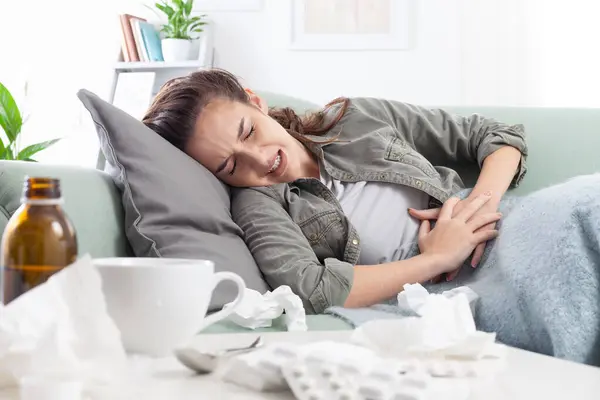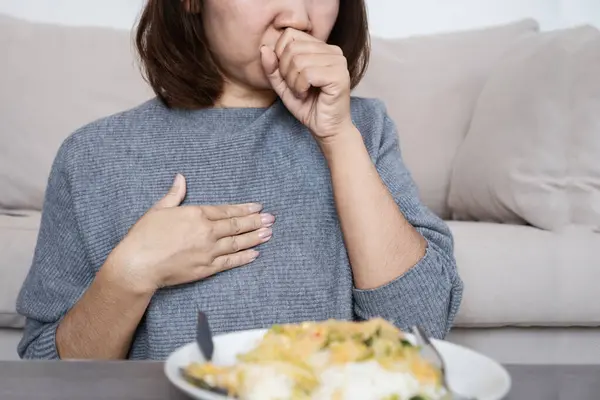Food poisoning is an illness caused by consuming contaminated food or drinks. It can stem from bacteria (like Salmonella, E. coli, or Listeria), viruses (such as norovirus), parasites, or even chemical toxins. The symptoms may appear within hours or days after ingestion, depending on the contaminant involved. According to the World Health Organization, foodborne diseases affect 1 in 10 people globally every year, with over 420,000 deaths annually—making early recognition and proper management vital.
Though most people recover without needing medical treatment, there are warning signs that should never be taken lightly. Ignoring severe symptoms or delaying care can lead to dehydration, organ failure, or long-term complications. That’s why understanding the dangerous signs and knowing how to manage mild cases at home is crucial for recovery.
Symptoms of Food Poisoning You Should Never Ignore
While mild food poisoning may only cause stomach discomfort and resolve in a day or two, there are signs that indicate a more serious problem. These symptoms suggest the infection may have spread, become systemic, or caused dangerous complications.
Red-Flag Symptoms That Require Immediate Medical Attention

- Persistent vomiting: If you’re unable to keep any liquids down for more than 12 hours, the risk of dehydration becomes critical.
- High fever: A temperature above 101.5°F (38.6°C) could indicate a bacterial or viral invasion that the body is struggling to fight.
- Bloody diarrhea or vomit: This could signal damage to the intestinal lining or bleeding within the digestive tract.
- Severe abdominal pain or cramping: Unrelenting pain may suggest something more than irritation—possibly appendicitis or toxic bacteria like Clostridium perfringens.
- Signs of dehydration: Look for dry mouth, dark urine, sunken eyes, dizziness, and rapid heart rate.
- Neurological symptoms: Double vision, muscle weakness, or tingling might be related to botulism—a rare but deadly form of food poisoning.
These symptoms are your body’s way of waving a red flag. They shouldn’t be dismissed as just a “bad stomach.” A 2022 CDC report found that hospitalizations due to foodborne illness increased by 13% compared to the previous five years, mainly because people delayed care.
Common but Manageable Food Poisoning Symptoms
Not every case requires a trip to the ER. When symptoms are mild, they usually include:
- Nausea and vomiting
- Watery diarrhea
- Mild abdominal cramps
- Headache
- Low-grade fever
- Fatigue
These symptoms are your body’s defense mechanisms trying to eliminate the toxin or pathogen. Rest, hydration, and safe remedies can help speed recovery without medication in many cases.
What to Do at Home When Food Poisoning Hits
If your symptoms are manageable and don’t match the critical ones listed earlier, certain natural and proven remedies can promote healing. Many people underestimate the power of early, supportive care—but it makes all the difference.
Effective Home Remedies to Ease Food Poisoning Recovery

- Rehydration is Priority One: Dehydration is the most common complication. Replace lost fluids with oral rehydration salts (ORS) or electrolyte-rich drinks like coconut water or diluted sports drinks. Avoid caffeine and alcohol, as they worsen fluid loss.
- Ginger or Peppermint Tea for Nausea: Ginger’s anti-inflammatory compounds like gingerol can calm the stomach and reduce vomiting. Peppermint can also relax digestive muscles, offering relief from cramping.
- BRAT Diet for Gentle Nutrition: Once vomiting stops, stick to the BRAT diet: bananas, rice, applesauce, and toast. These foods are bland, easy to digest, and help firm up stools without irritating the stomach.
- Activated Charcoal (With Medical Guidance): Some health professionals recommend activated charcoal in early stages to trap toxins in the gut. Always consult a doctor before trying this, especially if you’re taking medications.
- Apple Cider Vinegar in Moderation: A diluted teaspoon of ACV in water may help balance stomach pH and reduce bacterial growth, although this remedy works best before full symptoms set in.
- Probiotics to Restore Gut Balance: Yogurt, kefir, or probiotic supplements may help restore healthy gut bacteria after a foodborne illness. These can shorten the duration of diarrhea, especially in viral cases.
How Long Does Food Poisoning Last?
The recovery timeline depends on the pathogen involved. For example, symptoms from norovirus often resolve in 1–3 days, while bacterial infections like Salmonella can persist for 4–7 days. In rare cases, like Listeria infection, incubation may last weeks, and symptoms might worsen gradually.
Age, immune system status, and existing health conditions also affect how long it takes to recover. Infants, elderly people, and those with chronic diseases often need more time—and sometimes professional intervention.
When Should You See a Doctor?
Sometimes it’s hard to know when to transition from home remedies to hospital care. If you notice worsening symptoms after 48 hours, increasing weakness, or signs of dehydration despite rehydration efforts, it’s time to call your doctor. One woman shared how her mild stomach bug spiraled into a 4-day hospitalization after ignoring repeated vomiting and fever. A quick clinic visit early on could have spared her days of IV fluids and antibiotics.
Preventing Food Poisoning: Simple but Powerful Habits
While no method guarantees complete protection, food poisoning is largely preventable. Here’s what works:
- Wash hands thoroughly before handling or eating food.
- Cook meat to safe internal temperatures—especially poultry, which should reach 165°F (74°C).
- Avoid raw milk and undercooked eggs.
- Store perishables below 40°F (4°C) and use within recommended dates.
Be cautious with street food, especially in regions with questionable sanitation.
Final Thoughts
Food poisoning is more than just a minor inconvenience—it can be deadly if the warning signs are overlooked. While many cases resolve on their own, the dangerous symptoms highlighted above require swift attention. At the same time, effective home remedies, when used correctly, can ease discomfort and promote a faster recovery. Listening to your body, staying hydrated, and knowing when to escalate care are the cornerstones of safe recovery.
If symptoms are manageable, supportive care and rest often do the trick. But when the red flags appear, don’t hesitate to seek medical help. After all, when it comes to your health, timely decisions save lives.
Also Read | How to Get Rid of Body Odor Fast Naturally










